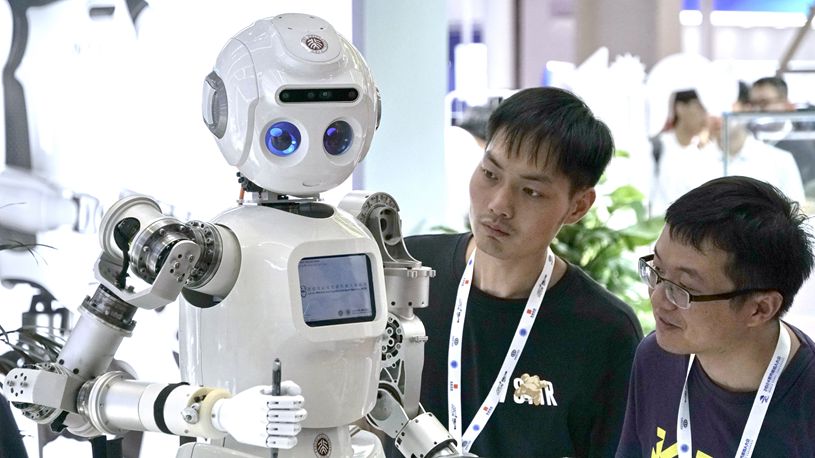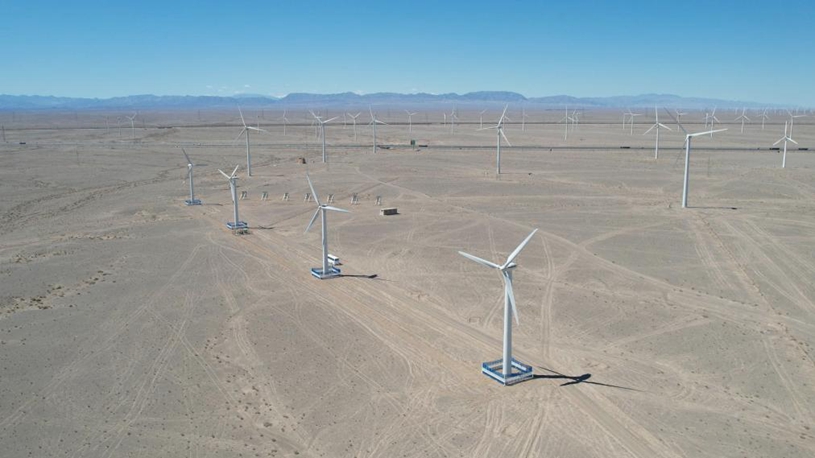BEIJING, Aug. 22 (Xinhua) -- Showing off all kinds of human-like interactions and skills, such as making heart gestures and winking at the audience, as well as cooking meals and performing calligraphy, 27 different humanoid robots have become the most buzz-worthy exhibits at the ongoing 2024 World Robot Conference in Beijing.
Over the years, global powerhouses of technology and innovation have competed fiercely to roll out human-like robot products and accelerated their iteration. The global market for humanoid robots is expected to hit 154 billion U.S. dollars by 2035, investment bank Goldman Sachs predicts.
Leveraging the advantages in its industry chain, consumption scenarios, databases and policy support, China is growing into an active force that cannot be ignored in the global industry of humanoid robots.
For a long time before 2022, China's humanoid robot industry remained at the stage of basic research and technology accumulation, and the leading products were mostly small robots for education, along with a modest number of full-size humanoid robots for experiments, exhibitions or performances.
However, starting in 2023, the industry entered its breakout period, with the industrial scale surging to 3.91 billion yuan (about 549 million U.S. dollars), up 85.7 percent year on year, according to research on the ecological development of the Chinese humanoid robot industry issued this year by the China Center for Information Industry Development (CCID) under China's Ministry of Industry and Information Technology (MIIT).
Early last month, the 5G smart factory of Chinese electric vehicle brand Zeekr welcomed its new "employees" -- the industrial humanoid robot Walker S Lite developed by UBTECH Robotics Corp., Ltd., a leading robotics firm based in Shenzhen, south China's Guangdong Province. With a maximum load of 15 kg, Walker S Lite can assist workers in carrying work bins.
The 5G smart factory is the fourth automobile plant that UBTECH has cooperated with this year. Previously, the company's humanoid robot Walker S had been integrated into industrial operations at the factories of Chinese electric carmaker NIO, Dongfeng Liuzhou Motor and FAW-Volkswagen.
Industry insiders said that 2024 is expected to become a key year for humanoid robots to venture out of labs into workshops.
"China boasts a large enough market and the world's best industrial supply chain, which is very conducive to the large-scale production of cost-effective products," said Jiao Jichao, vice president of UBTECH.
Data from Qichacha, a business data platform in China, shows that the country is now home to nearly 720,000 robot-related businesses. Among them, more than 20 enterprises are now producing complete humanoid robot products.
China has gained a first-mover advantage in the humanoid robot market that is basically consistent with developed countries, said Zhong Xinlong, an AI expert at CCID Consulting, a think tank under the MIIT.
As of July, China had more than 190,000 effective robot-related patents, accounting for about two-thirds of the world's total, Xin Guobin, vice minister of the MIIT, said at the 2024 World Robot Conference. A report released by a research institute under People.cn last year showed that China has taken a lead in humanoid robot technology worldwide, ranking first in the number of patent applications and valid patents.
As enterprises forge ahead on the new track of humanoid robots, the country has beefed up policy support for industrial development. China aims to establish a preliminary innovation system for humanoid robots by 2025, according to a guideline from the MIIT. By 2027, the country will see a secure and reliable industrial and supply chain system, and related products will be deeply integrated into the real economy.
Under policy guidance, various regions across the country are accelerating their efforts in the humanoid robot industry.
At the end of last year, China's first innovation center focused on core technologies, product development and application ecosystems for humanoid robots -- the Beijing Embodied Artificial Intelligence Robotics Innovation Center, or HUMANOID -- was established in the Beijing Economic-Technological Development Area.
Platforms like HUMANOID will share common breakthrough achievements with the whole industry, so that more enterprises can "stand on the shoulders of giants," which is conducive to the rapid development of the industry as a whole, said Xiong Youjun, the center's general manager.
Since the beginning of this year, manufacturing provinces such as Zhejiang, Shandong, Anhui and Sichuan have caught up by establishing innovation centers featuring industry-university-research-application integration.
"With the collaborative innovation of all parties, as well as the accelerated gathering of policy, capital and other factors, China's humanoid robot industry will also enter a period of active innovation," said Wang Jianing, a tech investment expert. "On the one hand, breakthroughs in core technologies are being made constantly, and on the other hand, the industry is also actively exploring a commercialization path suited to national conditions."
Experts forecast that the humanoid robot industry may usher in explosive growth in the next decade. According to a report released at the First Chinese Humanoid Robot Industry Conference in April, the market scale of the humanoid robot industry in China is predicted to reach 75 billion yuan by 2029, accounting for 32.7 percent of the world's total.
"With continuous accumulation, iteration and optimization, we are confident that we can accelerate alongside the global humanoid robot industry and excel in the sector," said Jiao. ■











